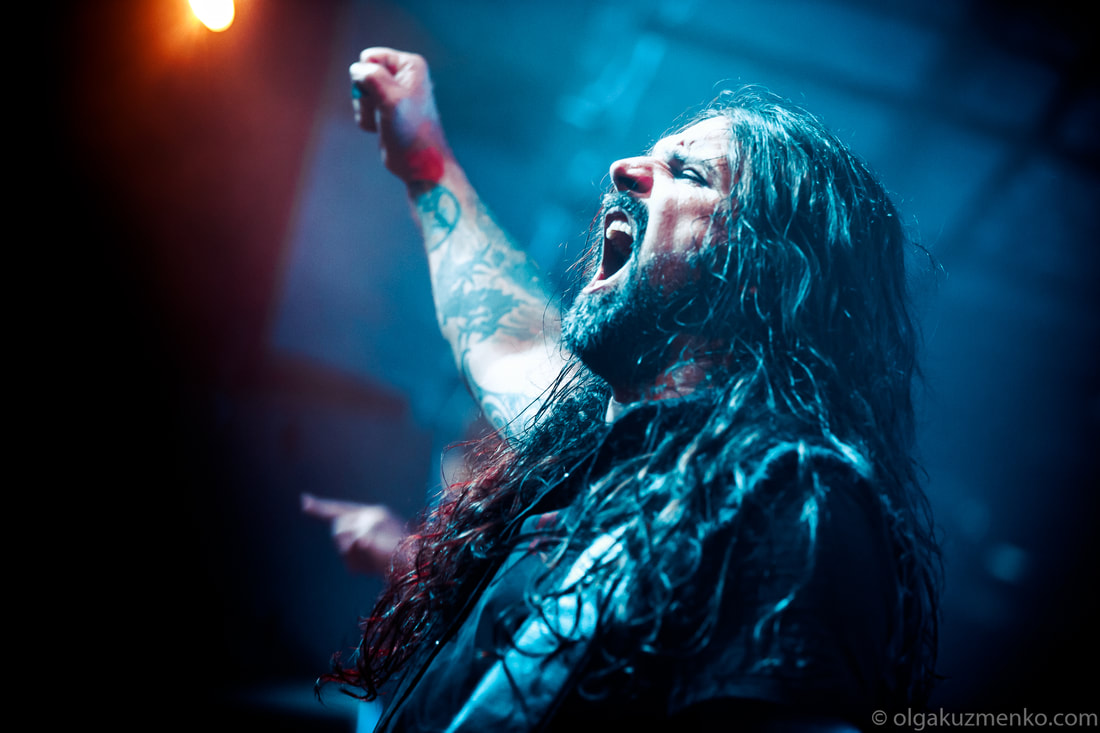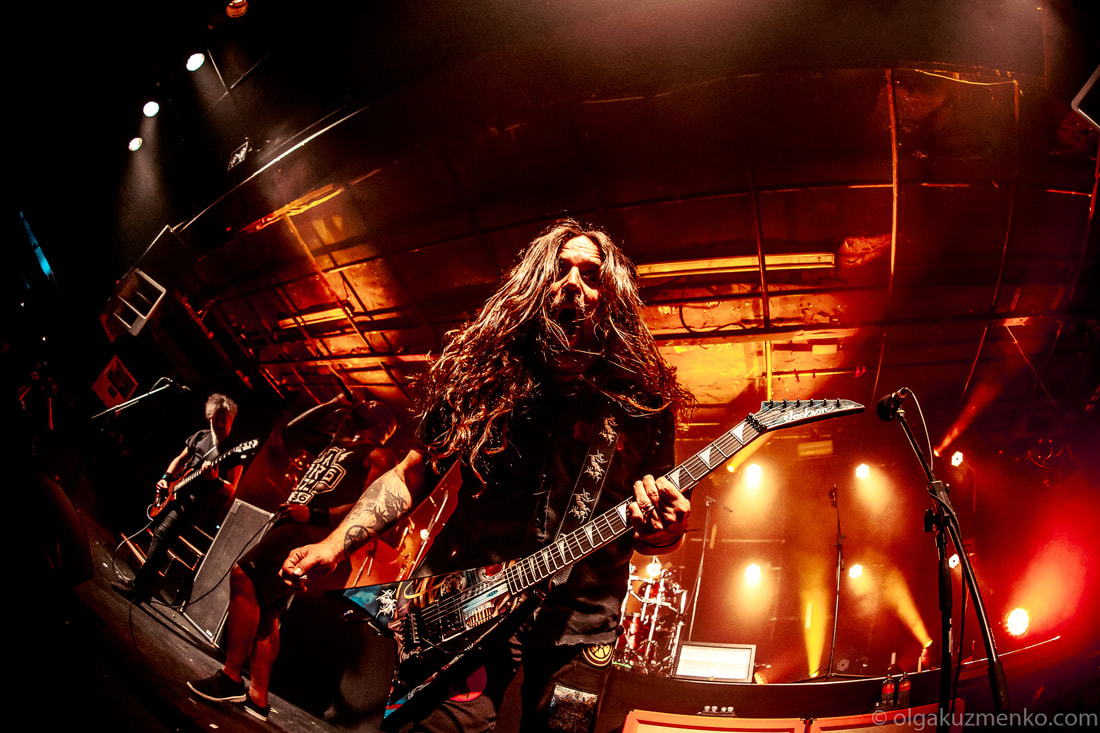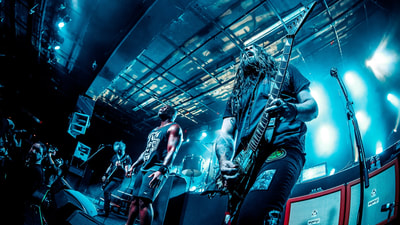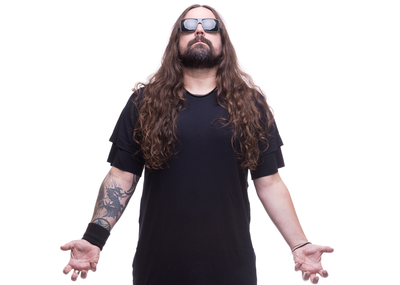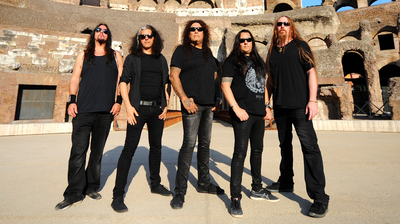|
As referenced in the title of their recent documentary, Sepultura have endured for over thirty years. On the road once more in support of fourteenth studio release ‘Machine Messiah’, they’ve recently also celebrated twenty years with Derrick Green fronting the band. Evolving along the way, they’ve broken down boundaries, and overcome the difficulties of more than one transition period. We sat down with guitarist Andreas Kisser to discuss ‘Machine Messiah’, some pivotal moments in Sepul-history, and covering other artists. Phantom self; Eamon O’Neill.
Hi Andreas, how are you today?
I’m good. We are on the third week of the tour. It’s the first headline run that we do for ‘Machine Messiah’, and it’s great, man. We’re very happy with the show, with the reaction of the crowd and the momentum; it’s really a special moment for us. The last time eonmusic spoke to you was almost a year ago, at the very beginning of the ‘Machine Messiah’ cycle; how has the show evolved since then? We stared with Kreator, and it was out first tour with ‘Machine Messiah’, but we didn’t have too much time really to introduce the new album. We played four new songs, I think, on the fifty minute set, but we didn’t present the first song ‘Machine Messiah’, and we didn’t play the instrumental song. Step by step, slowly we introduced those new songs, and now, we have a complete show. It’s our full show, we have an hour and a half on stage, and we play all the new songs that we wanted to play including ‘Machine Messiah’, and ‘Iceberg Dances’. We’re also putting a special celebration of twenty years of Derrick Green in the band, and [debut Derrick Green album] ‘Against’. We’re going to play a few songs from that album. It feels great to celebrate twenty years of Derrick, it’s unbelievable! It’s only a short time ago that you were celebrating thirty years of Sepultura; do you think some people forget how long Derrick Green has been in the band. They do. A lot of people like looking backwards, because for many people he is still the new singer, and he’s been twice as long as Max [Cavalera] in the band. But that’s normal, I guess; people have their image. I don’t know, if you talk about Black Sabbath for instance, I might not know how many years Tony Martin stayed with Tony Iommi, that kind of stuff, you know? But, it’s great that we are making sure that we are celebrating this date, because it’s so important, I think. ‘Against’ is the most important album in our life, in our career. Without ‘Against’, we wouldn’t be possible to be here today. As we discussed last time, the band really was up against things going in to make ‘Against’. Yes, yes, definitely, and to celebrate twenty years now, the momentum, with an album like ‘Machine Messiah’, with the label like Nuclear Blast, with the fan base we have; it’s unbelievable. It feels so great, and we are really enjoying this tour a lot, it’s amazing. When you Derrick joined the band, I’m guessing you weren’t looking to twenty years into the future. That’s why it’s so great. I think we made the right choice, and he did as well to be with us. And you see how much it’s possible to change stuff and still be Sepultura and still be faithful and honest with what you do, and not trying to repeat ‘Roots’ and repeat ‘Chaos A.D.’ all the time; it’s pathetic, it’s ridiculous! I mean, we live day by day, and we live in the present; that’s why we’re here now. It’s amazing to celebrate thirty-four years of a career, and twenty years of Derrick; we’re still very good friends, and we like each other. Why do you think it has lasted this long with Derrick at the helm? Because we are honest with ourselves and we do the best that we can, and we grow up. We kept studying music, me and Derrick talk a lot about documentaries, books; we’re always full of ideas of lyrics and names. Every time I start with a concept on the album, he’s the first one I go and talk to, and then we start to build that together. Then comes Paulo [Pinto, bassist] and Eloy [Casagrande, drummer]. Everybody’s aware of the concept, and then things really start to move. Going back to before Derrick joined, and you actually fronted the band for a huge show at Donington in 1996, when Max had to fly home after the death of his stepson.
We just decided to do the show as a trio because we did it before. On the first [European] tour we did in 1989 with Sodom, Max was always very fragile on the road. And of course with drinking too much, and always having stomach problems, he missed like, two shows on that tour, and we played as a trio. In my old band before I joined Sepultura, I was kind of the singer – the screamer, let’s say. And I knew all the lyrics; usually, when I play guitar, I sing, so the lyrics are more or less in my head. And we did that on the Ozzy tour as well, in ’92, when Max got sick; he was in the hospital and stuff, and we played as a trio opening for Ozzy, in a fucking sold out arena, and all the shows were great. It was really cool. When did you find out that you would have to front the band for the Donington show? It was the day before, actually. I arrived in the hotel, and as soon as I got to my room, I got the call form my wife saying that the accident killed Dana [Wells]. Dana was a good friend of ours, and Gloria Cavalera’s son, and I had to go to the room and pick up Gloria, the mother, and take her out of the room and tell her [that] her kid was dead. It was really heavy, but I guess I was the only one who could do that, because other people were just freaking out. I kept my head straight to make these kind of decisions. Gloria was completely out of her mind because of course, I cannot imagine, and Max as well, and they decided to go back to the States. I mean, Max could stay, but I’m not going to judge that, but we didn’t have any discussion. Sharon Osbourne provided Ozzy’s plane, they went to the States right away. What’s amazing is that you were pre-prepared to play as a trio, in a way. Pre-prepared for something you never know is going to happen, but somehow, you are. We all knew we could do that, because we did that before, and it was one of our amazing shows. I came onto the stage and I announced; “We’re going to make one minute’s silence; a member of Sepultura family died today”, and Castle Donington was silenced. I remember that; it was like goose bumps. It’s one of the most powerful moments of my life - I'd never felt something like that. And then; one, two, three, four; ‘Roots’ [sings guitar riff], and a sea of yellow shirts. That’s really positive, given how things ended in Brixton a few months later; was the band very much still together at that point? Yeah, I mean, it was very difficult times on ‘Roots’. When a tragedy like that happens, of course people unite; you put all the difference aside; the business, and all the crap that we were having during those days, but after that point was even worse, because, I mean, it was very difficult to deal with them because they were so fragile, and at the same time, they want to do big changes. It was crazy; we were fighting a lot, and we decided to go and to the European tour. Brixton Academy was our last show, and we terminated the contract with Gloria. That’s why Max left; he chose to leave because we fired our manager. Although things ended badly, it was the peak of the band’s success; do you look back at it as a golden time, despite the difficulties? In a sense, yes; in the other sense, it was a chaotic, hellish time. Sepultura was chaos backstage. Max was not a part of the band anymore, basically. He had his own bus, and after the show he disappeared; we couldn’t have the kind of conversation which is so healthy after the show, you know; “Hey, change here, there. Fucking great show”, you know? Five minutes - but so important for us, at least for myself, to keep the show improving, and not take it for granted. Did the band perhaps get too big, too fast? I think it was big the way it was supposed to be, I guess. It’s a great album, [but] we were not prepared to be that big, especially our structure, our management structure. That’s why we fired our manager; because she couldn’t do it. She couldn’t organise things, she was only thinking about the singer, and putting him in the most important position, and we were just the back-up band, and that was not Sepultura. On stage, and on practice, nobody was there but us, so we could deal with ourselves and play and did what we did. ‘Roots’ is a great album, and I’m very proud of it; working on it was very difficult, but at the same time, we achieved something fantastic there. But it was impossible to deal with anything; to make business, to discuss simple things, and we couldn’t really go much further than that. March 2018 sees twelve years since the release of ‘Dante XXI’; did you know that it would be the final album to feature Igor Cavalera?
Yes. It was another very difficult album to make. Any type of break up is very difficult; it takes time, and it’s not a decision that you do like that [*snaps fingers*]. Igor separated from his wife, he got another wife, he was tired of heavy metal, he wanted to talk to his brother again; a lot of stuff in his head, you know? And he was tired of Sepultura, tired of us, and vice versa. There was no motivation, there was no excitement to be together. One of the reasons I brought the idea to work Dante, Clockwork Orange and stuff, was because we went to the practice room and we didn’t have anything to do with each other anymore. But, with that concept, we managed to write and record ‘Dante’, which saved Sepultura, basically. Igor, he recorded the album, but he was through; enough, for him. He wanted to do more of the Mixhell stuff that he’s doing, the DJing, and then eventually, he came back to Max, and the brothers are together, which is very positive. They’re doing what they’re doing, and hopefully, they are happy, which is great. And we kept going our way which is very important as well, and now we have the best drummer in the universe. Moving on to more positive matters, and there’s been a lot of talk about your second solo album; the follow-up to 2009’s ‘Hubris I & II’. It’s weird, I don’t know why! Maybe it’s time? [*laughing*]. Yeah, the question has been popping up a lot lately. I always write; I have my Pro Tools on the road with me, and even with a smartphone to keep ideas and stuff. But I have no time really to stop and develop that. Sepultura is going through a very special moment; Sepultura needs my full energy. Besides, I have De La Tierra, as well, but my focus is on Sepultura right now. There’s a lot of stuff going on with Sepultura; the new album, the tour, we’re going to release the movie now – ‘Sepultura Endurance’ on DVD – and the show we did in Rock In Rio last year, on CD and DVD, so yeah, we have lots of plans. Who knows, in the next year or two, but I’m not concerned with that right now. We're here in Dublin, and I wanted to ask you about the unusual choice of U2’s ‘Bullet The Blue Sky’ as a cover song for Sepultura. I remember me, Max, Igor and Paulo, the band pus one roadie, a friend of ours Silvio, we went all to the movie theatre to see [U2 movie] ‘Rattle And Hum’. We were all metal heads, very kind of radicals, but we wanted to see that movie. People were saying it was like AC/DC, Led Zeppelin, you know; those movies with concerts and everything. We went to see that, and we were blown away, man. The version of ‘Bullet The Blue Sky’ on that movie is so heavy. Live, it’s so much bigger, and I started liking U2 after that, especially the lyrics, and all the political views of Bono. That inspired a lot, me and Max, with [how] we wrote the lyrics, and everything like that. Sepultura recorded a full-on covers EP in 2002, in ‘Revolusongs’.
With ‘Revolusongs’, we were between labels. We left Roadrunner, and we were dealing with SPV, and ‘Revolusongs’ was released by a Brazilian label. We closed the specific deal to do that EP, because we didn’t have a contract; we were in that phase of negotiating, and we wanted something to put out so we could keep playing. We talked to a lot of people, because we wanted to do some songs from bands that had nothing to do with metal. Of course we did Exodus and Hellhammer as well; we had to do that because they were two bands that we never really paid tribute to that were really very special in our career. But we went to talk to different producers, and people showed us many bands that I never heard before, like Can from Germany, and some other stuff, like Johnny Cash, all this stuff that was really crazy! And the U2 track was prominently featured on that album. U2 was one that came up, because of that impact that it had since a long time. The wish was really to do something really weird that people would never expect Sepultura to do. And U2 was the best reaction; We did the video clip, which won two prizes on MTV Brazil, for photography and direction. It’s one of our best videos, and it got played a lot, even on the radio, as well, in Brazil. Finally, what’s happening with Sepultura for the rest of the year? It’s a beautiful year ahead of us. We’re starting with this amazing tour here in Europe, and we go back to Brazil in April. In May, we go to Australia, New Zealand and Japan, for a show in Tokyo. And then we have festivals in August, here in Europe; Waken, Summer Breeze, Brutal Assault, and all those beautiful festivals. And then the plan is to release the movie and the DVD from Rock In Rio around October / November, and try to do an American run supporting the new material, which is still ‘Machine Messiah’. And that’s it; it’s touring, and releasing this product, and maybe by the end of 2019, maybe have a new album, who knows? Like this interview? Like us on Facebook and follow us on Twitter for regular updates & more of the same. |
|
Sepultura
"It feels great to celebrate twenty years with Derrick. ‘Against’ is the most important album in our career; without ‘Against’, we wouldn’t be here today." - Andreas Kisser.
© 2016 - 2024 eonmusic.co.ukContact: [email protected]
|

